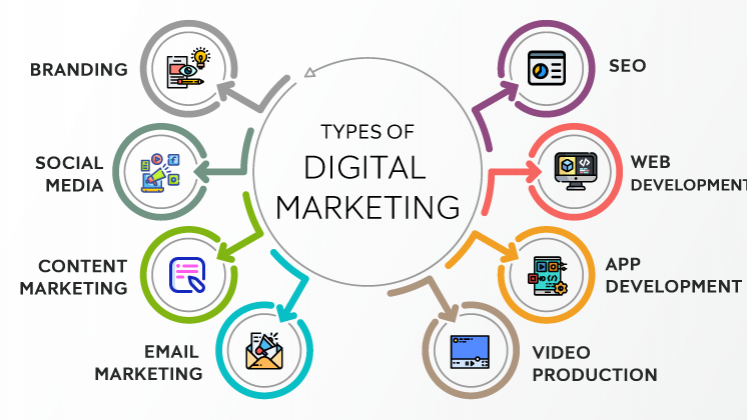Types of Digital Marketing Introduction Digital marketing has revolutionized the way businesses reach and engage with their customers. It encompasses various online strategies that help brands promote their products and services effectively. Understanding the different types of digital marketing is crucial for businesses to develop a well-rounded marketing plan. In this article, we will explore the various types of digital marketing and how they contribute to business success. 1. Search Engine Optimization (SEO) SEO is the practice of optimizing a website to rank higher in search engine results pages (SERPs). It involves techniques such as keyword research, on-page optimization, link building, and improving website speed and user experience. SEO helps businesses increase their organic visibility and attract more potential customers. Benefits of SEO: Increases organic traffic Builds credibility and trust Improves user experience 2. Pay-Per-Click Advertising (PPC) PPC advertising allows businesses to place ads on search engines and other platforms, paying only when users click on them. Google Ads, Bing Ads, and social media ads are common PPC platforms. This method provides instant visibility and can drive targeted traffic to a website. Benefits of PPC: Immediate results Highly targeted audience Measurable ROI 3. Social Media Marketing (SMM) Social media marketing involves using platforms like Facebook, Instagram, Twitter, LinkedIn, and TikTok to promote brands, engage with audiences, and drive traffic to websites. It includes both organic posting and paid advertising. Benefits of SMM: Enhances brand awareness Increases customer engagement Provides a platform for customer support 4. Content Marketing Content marketing focuses on creating and distributing valuable content to attract and retain an audience. This includes blog posts, videos, infographics, e-books, and podcasts. The goal is to provide helpful information that nurtures leads and builds customer loyalty. Benefits of Content Marketing: Establishes brand authority Improves SEO rankings Engages and educates the audience 5. Email Marketing Email marketing involves sending promotional messages and newsletters to a targeted audience. It is a cost-effective method for nurturing leads and maintaining customer relationships. Automation tools help in segmenting and personalizing email campaigns for better engagement. Benefits of Email Marketing: High ROI Personalized communication Effective customer retention 6. Affiliate Marketing Affiliate marketing is a performance-based strategy where businesses reward affiliates (partners) for driving traffic or sales through referral links. Influencers, bloggers, and content creators often participate in affiliate programs. Benefits of Affiliate Marketing: Low-cost marketing strategy Expands brand reach Performance-based payouts 7. Influencer Marketing Influencer marketing leverages the audience of social media influencers and industry experts to promote products or services. Businesses collaborate with influencers who have a loyal following to drive brand awareness and sales. Benefits of Influencer Marketing: Builds trust and credibility Reaches niche audiences Generates high engagement 8. Video Marketing Video marketing involves using videos to promote products, services, or brand messages. Platforms like YouTube, TikTok, and Instagram Reels have made video content essential in digital marketing strategies. Benefits of Video Marketing: Increases engagement and retention Boosts SEO rankings Highly shareable content 9. Mobile Marketing Mobile marketing focuses on reaching users through mobile devices via SMS, push notifications, mobile apps, and mobile-friendly websites. As mobile usage continues to grow, businesses need to optimize their strategies for mobile audiences. Benefits of Mobile Marketing: Direct and instant communication High engagement rates Location-based targeting 10. Online Reputation Management (ORM) ORM involves monitoring and improving a brand's online presence by addressing negative reviews, engaging with customers, and maintaining a positive brand image. It helps businesses build credibility and trust among customers. Benefits of ORM: Enhances brand credibility Mitigates negative publicity Strengthens customer trust 11. Programmatic Advertising Programmatic advertising uses AI and machine learning to automate ad buying and placement, ensuring better targeting and cost efficiency. Benefits of Programmatic Advertising: Real-time ad placements Cost-effective campaigns Higher targeting precision 12. Chatbot Marketing Chatbots are AI-powered tools that engage with customers, answer queries, and provide support 24/7, enhancing user experience and lead generation. Benefits of Chatbot Marketing: Instant customer support Personalized user experience Increased lead conversions 13. Native Advertising Native ads blend seamlessly into the content of websites or platforms, making them less intrusive and more engaging for users. Benefits of Native Advertising: Higher engagement rates Improved user experience Less ad fatigue 14. Voice Search Optimization With the rise of voice assistants like Alexa and Siri, optimizing content for voice search ensures better visibility in search results. Benefits of Voice Search Optimization: Better local SEO performance Enhanced user experience Increased website traffic 15. Augmented Reality (AR) Marketing AR marketing enhances customer interaction by allowing users to visualize products before purchasing, such as virtual try-ons for fashion or home decor. Benefits of AR Marketing: Interactive brand experience Higher engagement rates Improved customer decision-making Conclusion Digital marketing offers businesses multiple avenues to reach their target audience and achieve their marketing goals. By understanding and implementing various types of digital marketing, businesses can create effective strategies that drive growth and success in the competitive online landscape.







